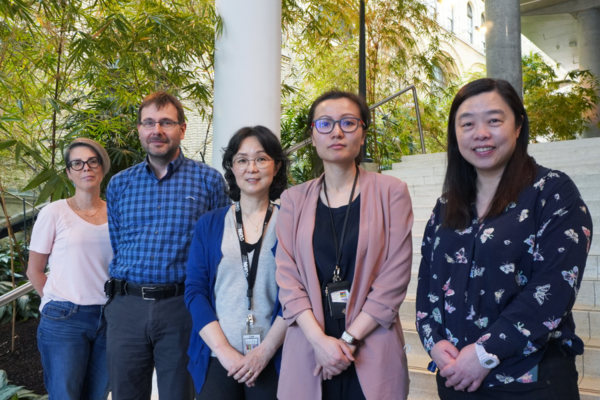Main Second Level Navigation
Breadcrumbs
- Home
- Postgraduate
- Areas of Focused Competence
- Cytopathology
Cytopathology
Cytopathology Area of Focused Competence (AFC) Program overview
The AFC Cytopathology Diploma Program’s goal is to provide dedicated subspecialty training for pathology residency graduates interested in pursuing a career in this area of diagnostic pathology.
Based at two academic hospitals, the University Health Network/Toronto General Hospital and the Sunnybrook Health Sciences Centre, the program aims to meet the increasing demand for specialist cytopathology expertise.
The training will provide you with the skills necessary to contribute to and oversee the operations of a modern cytopathology laboratory in Canada at a medical, organization and procedural level.
Find out more about Cytopathology
Cytopathology: Training for a Field of the Future An interview with Dr. Joerg Schwock soon after he graduated from the program.
Watch a short video from the Medical Laboratory Professionals' Association of Ontario (MLPAO) about the UHN Cytopathology team
Program structure
The fellowship provides training in:
- Cytodiagnostics with access to cytological specimens from essentially all organ sites
- Specimen acquisition and on-site evaluation including a pathologist-led fine-needle clinic
- Current techniques in specimen triage, processing, evaluation and ancillary testing
- Up-to-date methods in quality improvement, laboratory performance and patient safety
- Communication skills in interaction with patients, relatives, laboratory and hospital staff
- Clinicopathological research and training through scientific project(s) and teaching
We focus on:
- Diagnostic proficiency
- Quality assurance and improvement techniques
- On-site assessment for EBUS/EUS, fluoroscopic, CT- and U/S-guided sampling
- Performance of ultrasound- and palpation-guided FNAs
- Ancillary studies (Immunohisto/cytochemistry, Flow cytometry, HPV testing, Molecular testing, Cytogenetics)
- Academic research and peer teaching
- Trainee participation in program planning and improvement
Supported through:
- Combined annual specimens: ~40,000
- Papanicolaou tests (SurePath, ThinPrep): ~10,000
- Fine needle aspirations: ~9,000
- Consultation cases: ~800 - 1,000
How you are assessed
You will be expected to maintain a training portfolio consisting of:
- Continuous in-training evaluation
- Structured case log
- In-training examinations (slide-based, digital image-based, oral)
- Documented training assignments (consultation, critical results, quality, health policy etc.)
- Documented ancillary test result analysis and reporting
- Documented contribution to educational peer activities
- Evidence of scholarly activity
At the end of the program, your portfolio will be assessed by the AFC Competence Committee and the Program Co-directors and, if successful, you will obtain an RCPSC diploma in official recognition of your subspecialty training.
Competency training requirements for the Area of Focused Competence in Cytopathology
See the requirements from the Royal College of Physicians and Surgeons of Canada (RCPSC). (PDF)
Eligibility and how to apply
To be eligible:
- You must meet the minimum eligibility requirements for licensure (independent practice license preferred) with the College of Physicians and Surgeons of Ontario (CPSO).
- Specialist Status: You must have completed residency training in Diagnostic and Molecular Pathology or Diagnostic and Clinical Pathology and must be certified by the Royal College of Physicians and Surgeons of Canada or equivialent.
- Malpractice Insurance: You must have malpractice insurance with the Canadian Medical Protective Association (CMPA).
Application process
Application deadline for July start: September 1 of the prior year (for example, September 1, 2020 application deadline for July 2021 start date).
To apply, follow the same process for Clinical and Research Fellowships.
Funding
The fellowship is funded in an amount consistent with the funding requirements set by the Fellowship Education Advisory Committee of the Postgraduate Medical Education office.
Who we are
We are a team of Cytopathology faculty at the University Health Network and the Sunnybrook Health Sciences Centre and are looking forward to welcoming you!
Contact us at pathology.residency@utoronto.ca to find out more about the program or speak to a Co-Program Director or past trainee.

University Health Network team
(left to right)
Paula Nixon, LMP Postgraduate Education Officer
Dr. Joerg Schwock
Dr. Hyang Mi Ko
Dr. Si Kei Lou
Beatrice Wong, LMP Clinical and Professional Program Assistant

Sunnybrook Health Sciences Centre team
(left to right)
Dr. Anna Plotkin
Dr. John Wong
Dr. Zeina Ghorab
Dr. Jelena Mirkovic
Our graduates
All our trainees now work in hospital laboratories in Canada.
|
Name |
Year completed training |
Now working in Cytopathology in... |
|---|---|---|
|
Si Kei Lou |
2020/21 |
Toronto General Hospital/University Health Network, Toronto, ON |
|
Blerta Starova |
2018/19 |
William Osler Health Centre, Brampton, ON |
|
Svetlana Carrigan |
2017/18 |
Orillia Soldiers' Memorial Hospital, Orillia, ON |
|
Lorna Mirham |
2016/17 |
North York General Hospital, Toronto, ON |
|
Philippe Stephenson |
2015/16 |
Centre hospitalier de l'Université de Montréal, Montreal, Quebec |
|
Joerg Schwock |
2014/15 |
Toronto General Hospital/University Health Network, Toronto, ON Program Co-Director for Cytopathology |
More about education in Cytopathology
The Canadian Area of Focused Competence (AFC) in Cytopathology experience: the first four years. Weir MM, Boerner SL, Auger M. J Am Soc Cytopathol. 2016 Nov-Dec;5(6): 309-312
Auger M, Schwock J, Weir MM, Brimo F, Boerner S, Zeman-Pocrnich C, Myles N, Sekhon H, Gorombey S, Islam S. Area of Focused Competence in Cytopathology: An empowered version of Fellowship Training in Cytopathology in Canada. Canadian Journal of Pathology. 2021 Canadian Journal of Pathology.
